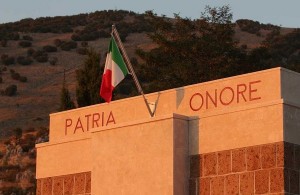By Tom Wescott.
Tripoli, 17 August:

There have been widespread protests at the erection in his home town, of a memorial to a . . .[restrict]convicted Italian war criminal, guilty of widespread crimes in Libya.
However some human rights activists here seem less exercised about the new memorial erected in Italy to honour the war criminal Field Marshall Rodolfo Graziani who was responsible for the deaths of thousands of Libyans during the fight against Italian colonial rule.
“We are too occupied in building our country to make this an issue” Hana Al Gallal, from the Benghazi National Council for General Freedom and Human Rights, told Libya Herald today.
Gallal admitted that the older generations, many of whom still carry the memory of atrocities carried out during Italy’s 32-year colonial rule in Libya, could be “disturbed and agitated” by such a monument.
“Those who really suffered and lost people and who have a direct connection to the colonisation time will always have this pain in their hearts,” she said. “For the people here he is a bad guy. He is a person who was responsible for misery.”
The newly-unveiled mausoleum and memorial park in the small town of Affile near Rome, honours the fascist general who led military campaigns in Libya. Nicknamed ‘the butcher of Fezzan,’ he set up concentration camps which were responsible for the deaths of thousands of Libyans who perished of disease or malnutrition. He also executed many insurgents and eventually caught and hanged the leader of the resistance movement Omar Mukhtar.
Graziani held a number of roles in colonial Libya, including vice-governor, and then governor, of Italian Cyrenaica from 1926 to 1934 and then general governor the entire country from 1940. After the end of World War II, he was sentenced to 19 years in prison but only served two years before being released.
The opening of the memorial, attended by Affile’s mayor and a representative from the Vatican, has also caused controversy in Italy. This is not least because the mayor of the town, Ercole Viri, voiced hopes that future comparisons might be drawn between Graziani’s memorial and Mussolini’s burial place, which has become a shrine for neo-fascists. Honouring fascist leaders of the past in this way is not widely popular in Italy and the main left-wing group, the Democratic Party, has spoken out against it, highlighting Graziani’s war crimes in Africa.
In no small part, because of the brutality of Rome’s colonial rule, Italy’s trade relations with Libya recovered only slowly after the war . However they accelerated under the Berlusconi government.
“The relationship in general is usually very peaceful and on good terms” Gallal said, noting that: “The Italian consulate is the only consulate in Benghazi and is always treated with respect and friendship.” [/restrict]











